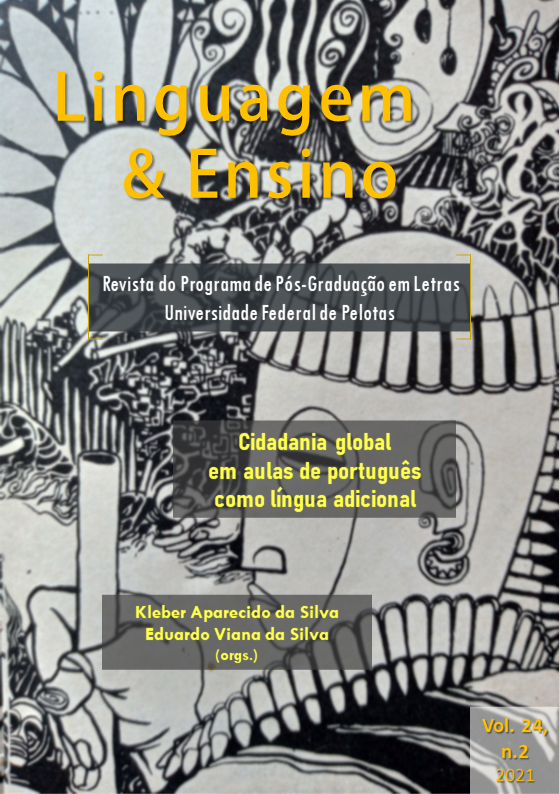Modelo evolucional de competências interculturais de alunos chineses de pla
Comunidade de aprendizagem em tandem para a era de pós-covid-19
Resumo
Dentro da estrutura de um projeto-piloto chinês-português, durante a pandemia de Covid-19, foi criado um espaço de “comunidade de aprendizagem” por meios telecolaborativos online, ou tandem, o qual resulta de uma experiência com sessões sucessivas em que os alunos chineses de PLA (Português Língua Adicional) interagem com alunos portugueses de chinês. Levando em conta o processo evolutivo a partir do etnocentrismo até ao relativismo (Bennett, 1993), propõe-se no presente trabalho, uma novidade, que é existência de uma linha de progressão que ilustra uma evolução multidimensional das competências interculturais, pela análise qualitativa dos dados coletados. A pesquisa qualitativa revela que, a evolução das competências interculturais é estruturada num modelo composto por cinco dimensões, nomeadamente o diálogo, a comunicação, a língua, a introspetiva e o relacionamento, com uma ênfase colocada nas relações interpessoais. O presente estudo procura assim perspetivar uma cidadania global e ao mesmo tempo localizada, com caraterísticas de He e Li de doutrina confuciana chinesa.
Downloads
Referências
ARASARATNAM, L. A. Research in intercultural communication: Reviewing the past decade. Journal of International and Intercultural Communication, v. 8, n. 4, p. 290-310, 2015. https://doi.org/10.1080/17513057.2015.1087096
BANKS, J. A. An introduction to multicultural education. Boston, MA: Allyn and Bacon, 1994.
BENNETT, M. J. Towards ethnorelativism: A developmental model of intercultural sensitivity. In: PAIGE, R. M. (org.). Education for the intercultural experience. 2 ed. Yarmouth, ME: Intercultural Press, 1993. p. 21-71.
BRISLIN, R. W.; YOSHIDA, T. Intercultural communication training: An introduction. London: Sage Publications, 1994.
CAREY, J. Communication as culture: Essays on media and culture. Boston: Unwin Hyman, 1989.
CHEN, G. M.; STAROSTA, W. J. Intercultural communication competence: A synthesis. Communication Yearbook, v. 19, p. 353-383, 1996.
CHEN, G. M.; STAROSTA, W. J. A review of the concept of intercultural awareness. Human Communication, v. 2, n. 1, p. 27-54, 1998-9.
CHEN, L. (陈来). 孔夫子与现代世界 [Confucius and modern world]. Beijing: Peking University Press, 2011.
DAI, X. D. (戴晓东). 跨文化能力理论发展六十年:历程与发展 [60 years of theory building of intercultural competence: development process and perspectives]. 外语界 [Foreign Language World], Shanghai, n. 4, p. 58-66, 2019.
DAI, X.; CHEN, G. M. (org.). Intercultural communication competence: Conceptualization and its development in cultural contexts and interactions. Cambridge: Cambridge Scholars Publishing, 2014.
DEARDORFF, D. K. Definitions: knowledge, skills, attitudes. In: BENNETT, J. M. (org.). The SAGE encyclopedia of intercultural competence. Thousand Oaks, CA: Sage Publications, 2015. p. 217-220.
GAO, Y. H. (高一虹). 跨文化交际能力的“道”与“器” [“Tao” and “Devices” for cross-cultural communicative competence]. 语言教学与研究 [Language Teaching and Linguistic Studies], Beijing, n. 3, p. 39-53, 1998.
GAO, Y. H. (高一虹). 跨文化交际能力的培养:“跨越”与“超越”[Intercultural communicative competence education: “crossing” and “transcending”]. 外语与外语教学 [Foreign Languages and Their Teaching], Dalian, n. 10, p. 27-31, 2002.
GLASER, E.; GUILHERME, M.; GARCÍA, M. C.; MUGHAN, T. ICOPROMO, intercultural competence for professional mobility. Brussels: Council of Europe, 2007.
GONÇALVES, L. Aprendizagem intencional em tandem: os modos comunicativos na telecolaboração em língua estrangeira. In: OSÓRIO, P.; GONÇALVES, L. (orgs.). O ensino do Português como língua não materna: metodologias, estratégias e abordagens de sucesso. Coleção AILP, v. 2. Rio de Janeiro: Dialogarts, 2019. p. 16-59.
HAMMER, M. R.; BENNETT, M. J. The intercultural development inventory [instrument]. Portland, OR: Intercultural Communication Institute, 2001.
HOLMES, P.; O’NEILL, G. Developing and evaluating intercultural competence: Ethnographies of intercultural encounters. International Journal of Intercultural Relations, v. 36, n. 5, p. 707-718, 2012. https://doi.org/10.1016/j.ijintrel.2012.04.010
Jia, Y. X. (贾玉新). 跨文化交际学 [Intercultural Communication]. Shanghai: Shanghai Foreign Language Education Press, 1997.
KEDIA, B. L.; MUKHERJI, A. Global managers: developing a mindset for global competitiveness. Journal of World Business, v. 34, n. 3, p. 230-251, 1999. https://doi.org/10.1016/S1090-9516(99)00017-6
KING, P. M.; BAXTER MAGOLDA, M. B. A developmental model of intercultural maturity. Journal of College Student Development, n. 46, p. 571–592, 2005. https://doi.org/10.1353/csd.2005.0060
MARTIN, J. N. Revisiting intercultural communication competence: Where to go from here. International Journal of Intercultural Relations, v. 48, p. 6-8, 2015. https://doi.org/10.1016/j.ijintrel.2015.03.008
MATSUO, C. A critique of Michael Byram's Intercultural Communicative Competence Model from the perspective of model type and conceptualization of culture. Fukuoka University Review of Literature & Humanities, v. 44, p. 347-380, 2012.
SHEN, J. M.; GAO, Y. C. (沈鞠明, 高永晨). 基于知行合一模式的中国大学生跨文化交际能力测评量表构建研究 [Construction of Intercultural Communication Competence Inventory for Chinese College Students Based on Knowing-and-Doing Model]. 中国外语 [Foreign Languages in China], Beijing, v. 12, n. 3, p. 14-21, 2015.
SPITZBERG, B. H.; CHANGNON, G. Conceptualizing intercultural competence. In: DEARDORFF, D. K. (org.). The SAGE handbook of intercultural competence. Thousand Oaks, CA: Sage Publications, 2009. p. 2-52.
STRAUSS, A.; CORBIN, J. M. Basics of qualitative research: Grounded theory procedures and techniques. Thousand Oaks, CA: Sage Publications, 1990.
VYGOTSKY, L. S. Mind in society: The development of higher psychological processes. Cambridge, MA: Harvard University Press, 1978.
Wang, Y. (王宇). 维度与现状:跨文化能力情感层面研究 [Components and Status Quo: a study of affective perspective in intercultural competence]. 东北师大学报 (哲学社会科学版) [Journal of Northeast Normal University], Changchun, v. 6, p. 39-44, 2017.
WANG, Y. A.; KULICH, S. J. Does context count? Developing and accessing intercultural competence through an interview-and model-based domestic course design in China. International Journal of Intercultural Relations, v. 48, p. 38-57, 2015. https://doi.org/10.1016/j.ijintrel.2015.03.013
Wen, Q. F. (文秋芳). 英语口语测试与教学 [Oral English test and teaching]. Shanghai: Shanghai Foreign Language Education Press, 1999.
YANG, Y.; ZHUANG, E. P. (杨盈, 庄恩平). 构建外语教学跨文化交际能力框架 [Constructing a framework for cross-cultural communication in foreign language teaching]. 外语界 [Foreign Language World], Shanghai, v. 4, p. 13-21, 2007.
ZHANG, H. Z. Avaliação de competência intercultural: estudantes universitários chineses de PLE. 2019. 320 f. Tese (Doutorado em Linguística) – Programa de Pós-Graduação em Português como Língua Estrangeira/Língua Segunda, Universidade de Lisboa, Lisboa, 2019.




1.png)
